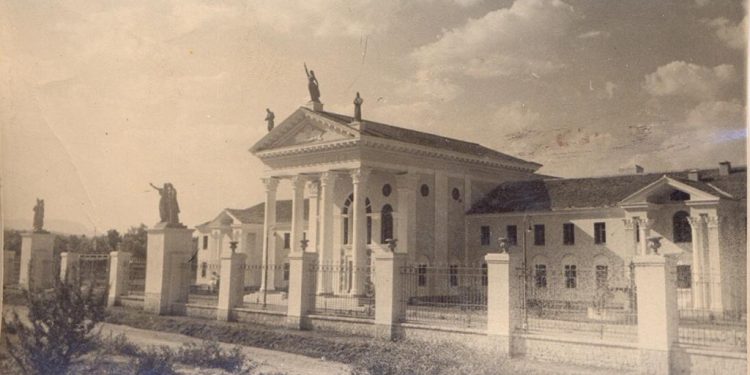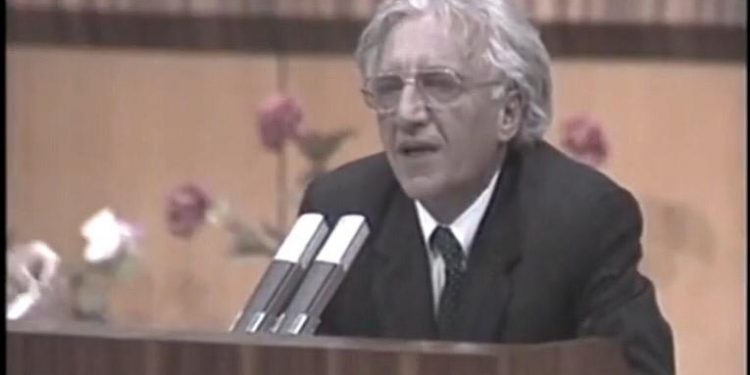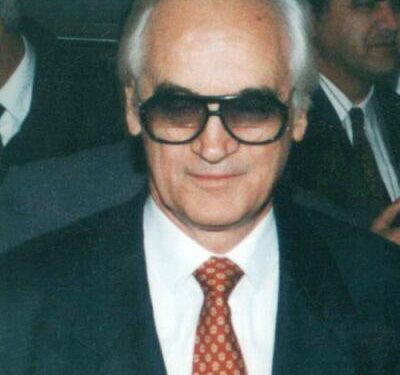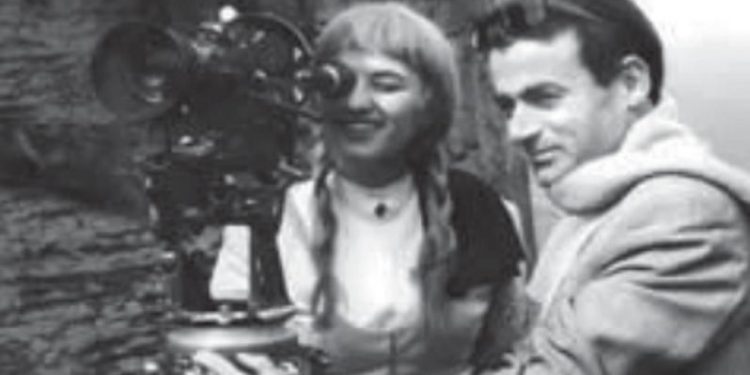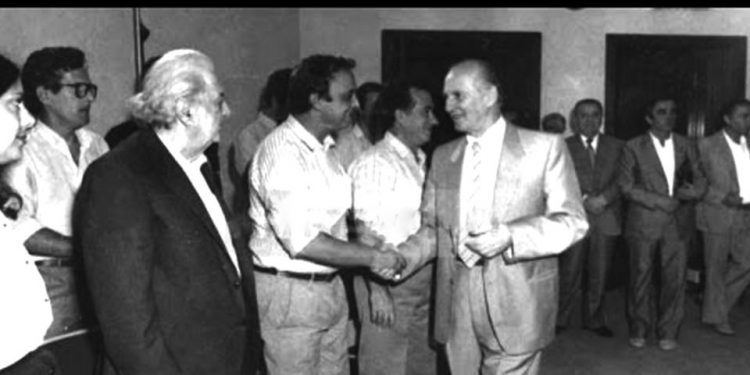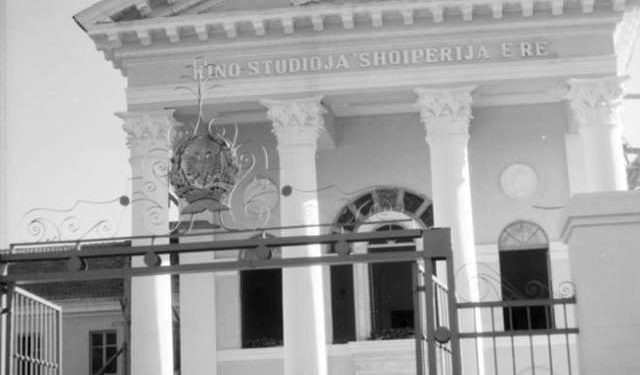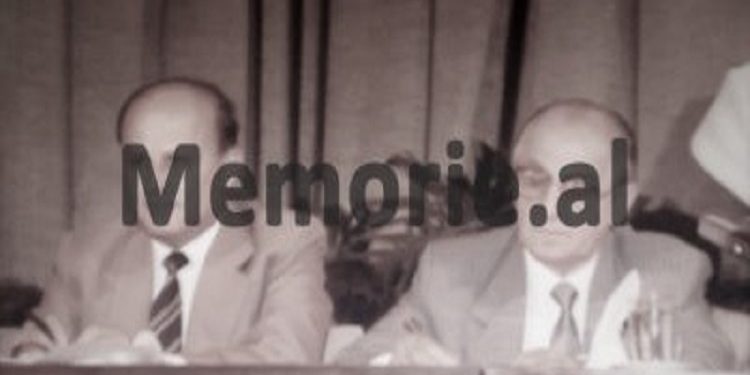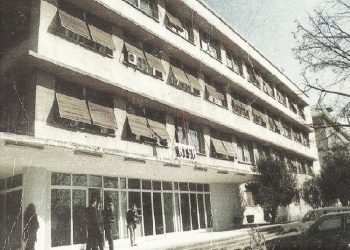Dashnor Kaloçi
Second part
Memorie.al publishes some archival documents extracted from the Central State Archive in Tirana (fund of the former Central Committee of the ALP), belonging to 1990, where there is a record of the meeting of the secretariat of the Central Committee of the ALP which, as the main item on the agenda, had “on some issues of today’s cinematic creativity” and in that meeting which was chaired by the First Secretary of the Central Committee of the ALP and the Chairman of the Presidium of the People’s Assembly of The People’s Socialist Republic of Albania, Ramiz Alia, in addition to the secretaries of the Central Committee such as: Foto Çami, Hekuran Isai and Lenka Çuko, also participated some of the highest officials of the party and state leadership of that time, such as: Spiro Dede, Abdyl Backa , Ali Vukatana, Sotir Koçollari, Alfred Uçi, Dritëro Agolli, Lisen Bashkurti, Skënder Gjinushi, Neritan Babamusta, Dhimitër Shandro, Marash Hajati etc. The full minutes of the meeting with conversations and discussions between Ramiz Alia and the senior party and state leadership of that time, with the main leaders from the creative sector of Kinostudio “Shqipëria e Re”, such as: Teodor Laço, Dhimitër Anagnosti and Nexhati Tafa, who dwelled for a long time on the problems of Albanian cinematography.
“Both ways seem to be rational and useful. Complete studies are also necessary, e.g. students of the directing branch at the Higher Institute of Arts, can study for directing after finishing 3-4 years of school. In general, and in other parts of the world, directors prepare after graduating from high school. Directing studies are a second school for them. In many cases, those who prepare for directing do not go to the faculties of drama or directing, but to other faculties, especially the faculties of literature. We have not practiced this until today, but with those of the director, because at the present time usually the director of the film is also the author or co-author of the screenplay. This would be one way of full professional preparation. The second way is to prepare the staff we have with postgraduate courses with a short period of 1 year for directing. For example, this year we successfully closed a postgraduate course with 4 students of directing, who made two good films. To prepare for the first road we sent a student to France who will study 4 years of directing. However, he is the only one and, in my opinion, seeing the demands that Kinostudio has today, it is very little …!”
This was stated, among other things, in his speech at one of the meetings of the secretariat of the Central Committee of the ALP in 1990, Teodor Laço, then head of the script editorial office at the Kinostudio “Shqipëria e Re”, a meeting on “Some issues of today’s cinematic creativity ”, which was chaired by the First Secretary of the Central Committee of the ALP and the Chairman of the Presidium of the People’s Assembly of the People’s Socialist Republic of Albania, Ramiz Alia, where in addition to other secretaries of the Central Committee, as Photo Çami, Lenka Çuko and Hekuran Isai, were also present in most of the senior party and state leadership of that time that had direct or indirect connections with art and culture. For more than what was discussed in that meeting where besides Teodor Laços, from Kinostudio “Shqipëria e Re”, participated also the director Dhimitër Anagnosti and the screenwriter, Nexhati Tafa, the document in question introduces us to the minutes of that meeting, which Memorie .al publishes it in full and for the first time, starting from this number.
Continued from the previous issue
Minutes of the meeting of the Secretariat of the Central Committee of the ALP, with the staff of the creative sector of Kinostudio “Shqipëria e Re”
COMRADE RAMIZ ALIA: How much did you sell them for?!
COMRADE TEODOR LAÇO: Their sale is based on the duration of the airtime.
COMRADE RAMIZ ALIA: Sold only as airtime or even through cinemas?!
COMRADE ALFRED UÇI: We have sold airtime films mainly in television centers.
HEKURAN ISAI COMRADE: What you gain from selling these films, let them be used to open booths at fairs.
COMRADE ALFRED UÇI: This year, we have provided funds for the opening of the stand at the Milan fair.
COMRADE RAMIZ ALIA: It seems to me that you have chosen a Nazi cinematography because the Italians are arrogant in this regard.
COMRADE TEODOR LAÇO: In Milan, an international film fair like the one in Cannes is taking place. I have seen this fair, and not only filmmakers but also traders from all over the world come there. Each state can give its stand according to the economic possibilities it has. I was interested and saw the booths of small places. For example, I talked to Bulgarians, and some cinematographers from other countries. I think there, too, we can open a booth, but have to pay its rent, a rent to get the videotape and throw the movies into the video. Illustrative tools such as film advertisements, plaques and figurations that other countries have at a higher level need to be better prepared. I think their production is not difficult. For the possibility of securing funds, I think that an effective way is that of securing bids. For example, we have a very good atelier with very large dimensions. We had an offer from the Swiss that they could rent it for a month to use it for film. That way we could get a lot of money. However, this issue has not been concluded yet, but we do not have any guidance on how to act.
COMRADE RAMIZ ALIA: Why what orientation do you need?!
COMRADE ALFRED UÇI: This proposal was made to us by a Swiss man who was in our country, because he did not have studios. He said it is convenient to make a movie here. We told him that we agree and that we are waiting for a concrete proposal. But so far, we have not made a formal request, although several months have passed.
COMRADE TEODOR LAÇO: If we rented your atelier for a month, we would earn $ 500,000.
COMRADE RAMIZ ALIA: Well, who else will discuss?!
COMRADE DHIMITER ANAGNOSTI: I wanted to say some thoughts about the problem of raw material for film production. Seeing this issue as an operator and as a director, but also the international events where I have been, I think it is really necessary for our film to grow in terms of quality. Film is a figurative art and in addition to the sound idea, it should have high quality and in figuration. Unfortunately, we get the negative of the film from East Germany because we cannot produce films because we have poorer quality. I do not know if there is any other place that buys them, the raw material but we get from them the worst values of the film. In addition to all our shooting technique, there are significant problems. It’s been a long time since we’ve gotten any new cameras, and now it takes a lot of work, time, and expense to renovate. For the qualitative growth of our cinematography, the internal energy of Kinostudios is of great importance. Still there, we work with an old method and structure that has been broadcast for a long time, since we produced 2-3 films a year. The demand now to produce 14 films a year, wants a big industry, another organizational logic, quite dynamic economic and scientific thinking. Today in the shooting square not all our energy of cinematic art is poured out in full. A new structure is needed to better organize this work.
COMRADE RAMIA ALIA: Do you have film directors as economists?!
COMRADE DHIMITER ANAGNOSTI: The directors of the film are economists, but not all the people who are part of the film crew are interested in the film. The most interested is the creator of the film that he does the work and wants this work to be as good as possible, while other people are out of this interest. They are almost ineffective in what happens beyond their narrow task. Often the deadlines for making films last only because of indifference, for some insignificant shortcomings, etc. To ensure a greater interest of all for the film, we must create an economic reward opportunity that serves as an incentive. I think this is a huge reserve of energy that is not used. He sees the release of this great internal energy in these situations as a very important moment for the increase of quality demands. We have to present a special reconstruction based on a scientific economic opinion.
COMRADE RAMIZ ALIA: Are filmmakers like you, Dhimitër, treated as creators from the point of view of reward, when they prepare a new film or are they paid as employees?!
COMRADE DHIMITER ANAGNOSTI: No, I only receive a salary as a clerk. However, I do not complain about this issue because motivation for work I have my creative and artistic interests.
COMRADE RAMIA ALIA: Yes, the screenwriter, is he treated as a creator?!
COMRADE DHIMITER ANAGNOSTI: When he is an internal employee of the film studio, he is not treated as a creator or screenwriter. While external screenwriters are paid based on the norms that have been set for the scenarios, maximum 2200 ALL.
COMRADE RAMIZ ALIA: Even the director of the film does not believe that he receives any kind of reward…?
COMRADE DHIMITËR ANAGNOSTI: No, he does not receive a reward. Only any of them can receive any bonus at the end of the year from the director’s fund, like all other distinguished employees in other enterprises.
COMRADE RAMIZ ALIA: What ideas did you have regarding this issue?
COMRADE DHIMITËR ANAGNOSTI: I have another idea. We often extend film production deadlines by one or two months after the scheduled delivery date. This increases the cost of the film. It seems to avoid these costs that increase the cost, a percentage can be deducted that as a permanent fee of the shooting group, while a part of it remains as a profit of the state. This would increase the pace of work and increase the quality. In this way any of the people in the background will be interested, both in the script and in the film, for its quick realization.
COMRADE ALFRED UÇI: From the discussions that have taken place for this purpose, it has been proposed that 40% of the possible savings during the preparation of the shortening of the start dates be distributed to the film crew. There is another proposal for movies that provide high revenue from having good attendance. For this the films should have a certain reward for the directors of the film, but after seeing its result.
COMRADE HEKURAN ISAI: Even in the film studio are applied almost the same reward rules that are applied in other companies. For example, a textile factory engineer may make an invention, but while working in this factory, he does not receive a reward for it, and if another engineer, outside the factory, made this invention, he would receive this reward.
COMRADE DRITËRO AGOLLI: And the screenwriters of the film receive a reward, when they prepare screenplays while they are on creative leave.
COMRADE DHIMITËR ANAGNOSTI: Directors never receive a reward. Screenwriters, in addition to those who have planned, can write other screenplays during the creative leave.
COMRADE RAMIZ ALIA: Clearly.
COMRADE ALFRED UÇI: Even the directors are recognized the copyright, when they produce a film more than the foreseen norm. There have been such cases. For example, Bujar Kapexhiu who has set the standard and in addition has produced other films and has been awarded.
COMRADE RAMIZ ALIA: These issues are being discussed by the comrades of the Culture and Arts Committee, Alfred?
COMRADE ALFRED UÇI: Yes, we have now prepared the relevant draft decisions.
COMRADE RAMIZ ALIA: These two variants that you mentioned should be reviewed together with them.
COMRADE ALFRED UÇI: We have prepared the draft decision, because there are no analogous decisions for this type of award…
COMRADE RAMIZ ALIA: If you remember Dritëro, once in the theater there was a kind of copyright reward that was practiced when the play was given. For each such rats the author received a reward for copyright that was practiced whenever the show was given. In each such case the author received a percentage of the reward from the ticket revenue.
COMRADE DRITËRO AGOLLI: Yes, then the author received a reward of three percent of the tickets sold. And in the regulation, we have now, a clause was initially envisaged, according to which the author had to be paid 30 percent, but it was not approved. This issue can now be looked at.
COMRADE TEODOR LAÇO: The issue is to find opportunities to stimulate the quality of the film. We have a movie that can make its own expenses and is watched by 300 thousand spectators, but there are others who do not provide even one tenth of the show. I would like to say something about the questions that were asked here:
The idea of producing feature films from television seems appropriate to me, not to facilitate our work at all, but it will create a better climate of cinematography throughout the country. Of course, television must find the specifics of its television film. In our opinion, there are two specifics for television films, serial film and soap operas. The serial film can be based on action screenings and real screenplays, while the soap opera is usually held in smaller environments and is realized by those who have much greater opportunities to shoot with electronic means, etc., which we do not have.
So, the production of films from television would fulfill part of the tasks of general film production in our country. We have another proposal, which we have discussed with Professor Alfred Uçi. They can switch to joint film productions with television. Today, many films are produced in this way in the world. From an extended TV movie variant, which can be in 5-6 series, it is switched to a more reduced cinematic variant. If we manage to put such a joint agreement on television, using common means and funds, then we can produce in this way some films, which are used by television for consumers, but also for cinemas, that from them emerges a reduced film. This year we produced two films wider than usual and released them in two parts for television, as well as in a shorter version for cinemas. They did it on their own initiative, without an agreement with the television, but in this direction, we can cooperate and go further. At the beginning of the year, an agreement can be reached between the two directorates and the two editorial offices of the film, that of television and the film studio, to prepare joint films with two variants.
Regarding the decisions of the 9th Plenum, we have proposed that the approval of the scripts be left to the film studio, while the Committee of Culture and Arts should approve only the extended thematic plans. We practiced this as a test two weeks ago. The friends of the Culture Committee presented the scripts of the second 6 months with expanded versions of 2-3 pages, to create an impression of the content of the film, without the need to read the entire script. However, we are waiting for approval on this issue, because according to the procedure, a decision is needed for the Council of Ministers for this purpose. But we think that this practice would put us in better job positions and increase our prestige of script editing. I also think that such a link as the artistic council should be strengthened and given more competencies. For now, the artistic council is a consultative body of the directorate, but can be increased to the level of a decision-making body. In its current composition there are many outsiders who do not work in the film studio, almost half the number of members.
Talking about this issue with Dhimitër Anagnosti and Nexhatiu, the three of us thought that it would be more appropriate to have an artistic council in the cinema studio, where the main personalities of the film studio, 10-12 people, would belong. This council may include the most prominent directors, directors, deputy directors, etc., and it should be a decision-making body that would decide and take responsibility for the scenario that it would put into production. Thus, the responsibility would be collegial and not channeled to an individual, only to the director of the institution.
FRIEND PHOTO ÇAMI: To have some external criticism.
COMRADE TEODOR LAÇO: There may be some, but it would be good if the main burden of responsibility lies with the people who work in the film studio.
COMRADE RAMIZ ALIA: This council would only approve the scenarios /
COMRADE TEODOR LAÇO: He will approve the scripts and films.
COMRADE DHIMITER ANAGNOSTI: He must also approve the artistic framework needed for the institution.
COMRADE RAMIZ ALIA: You also seemed to get some actors who will be seen in the movie studio…?
COMRADE DHIMITËR ANAGNOSTI: We did not get it, because we should not get actors who are only from the film studio, because they will become invalid within 2-3 years. Actors have to do artistic life in other institutions, such as theater, etc., because that is where the real school for actor’s mastery is. Their activity in the film studio is temporary, although from the activation in the movie’s martin great pleasure. I think that during the activation in the film studio, the actors should have a special treatment for the work difficulties that are created for them, but they are treated simply as employees, receive only the salary and nothing more. /Memorie.al
Continues in the next issue




